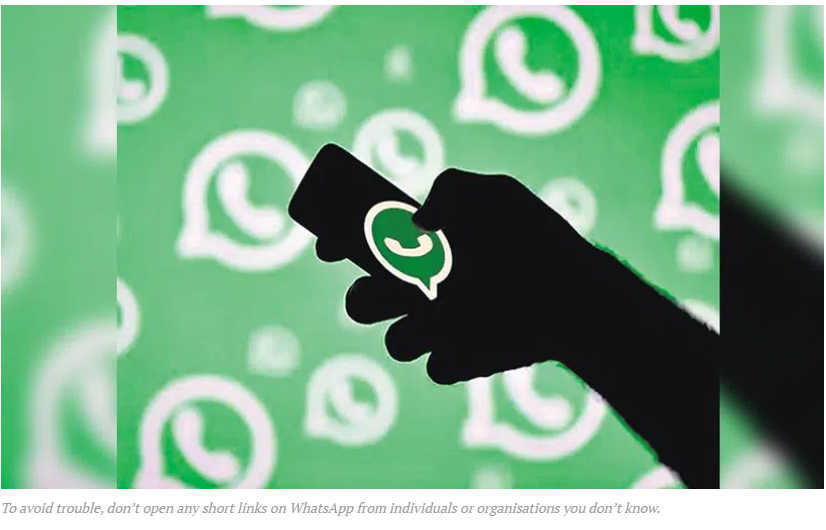Cyber Talk: Stay safe from WhatsApp scams

WhatsApp is the most popular messaging tool worldwide, with over two billion users. While the main feature is texting, WhatsApp also allows you to post statuses, send voice messages, share locations and make voice and video calls. However, a scammer can easily download your profile picture (from WhatsApp) and use it with any other number, impersonate you and cheat other people. There’s some risk involved, and we have listed here a few of the most recent WhatsApp scams.
Some recent scams
(1) Impersonation fraud: A fraudster gets the name and profile picture of a senior officer/political executive/constitutional authority, celebrity of any organisation/department from social media sites, email, messenger apps etc., and uses them to dupe their subordinates. There are a large number of applications sold on the dark web which give you access to contacts or friends list of the targeted victim.
Once the fake profile is created with a name and picture resembling exactly the same as on social profiles (fraudsters sometimes replicate all the postings in the fake profile), they then send WhatsApp messages to their targets, claiming an emergency and needing money on an urgent basis. Most of the victims transfer money without seeking much detailed information, assuming that their boss, loved one or friend is in a difficult situation and it is time to support them.
(2) WhatsApp verification/hijacking scam: To secure your account, WhatsApp employs two-factor authentication. When installing the app or logging back in, you’ll receive a six-digit code that you’ll use to access your WhatsApp account. If you didn’t request this verification, it should be a red flag that somebody is trying to steal your account or has access to your phone.
Scammers who are looking into your account want your verification code to hijack your WhatsApp account. Never share your code to make sure your account is safe. In most of the verification scams, the WhatsApp number taken over is used for future scamming or wanting to cause damage to the victim’s reputation.
(3) WhatsApp Gold: The WhatsApp Gold membership appears to be a recurring WhatsApp scam every few years. You will possibly see a message offering an exclusive, feature-rich version of WhatsApp designed for celebrities and high-profile accounts. Scammers may additionally send a message warning that if you do not upgrade, your phone will be hacked. However, there’s no such release from WhatsApp. The invitation link provided will have malware, which can steal information on your phone. If you receive an invite to WhatsApp Gold, just block the number from which it came.
(4) Coupon Scams: You receive links to coupons and specials for your favourite shopping places, and supermarkets, where you have subscribed or are a member. Fraudsters take this as an opportunity and send fake coupons /discount offers and request you to click the links. Opening such links to redeem the discount will result in the installation of malware or other issues on your phone. To avoid trouble, don’t open any short links on WhatsApp from individuals or organisations you don’t know. You have to first verify if it is a phishing link or a genuine link before you claim the offer or discount.
(5.) Sextortion/Romance Scams: Scammers will ping you on WhatsApp with a high-profile model and claim to know you and want to have a discreet relationship with you. In curiosity, the victim starts chatting and falls for the fake narrative. Suddenly, the girl will undress slowly, get nude and make you get nude. The experience will quickly take a U-turn. The scammer will claim that they have your pictures/screen recordings of the brief cyber-sex session and say they will send them to everyone the victim knows.
Tactics used by fraudsters
* The scammer conveys a sense of urgency and tries to convince you or pressurises you to either pay quickly or quickly scan the QR code or share the OTP or verification code.
* Messages from fraudsters are written in poor English, as they are often not well educated.
* The fraudsters do not want to be called on their direct number; instead, they prefer WhatsApp voice and text messages.
* The fraudster asks you to transfer money to an unknown account or uses an app that doesn’t show account numbers such as PayPal etc.
* Fraudsters usually send fake FIR and lawyer notices on WhatsApp to victims and morph their pictures to send unruly images on the victim’s networks.
Safety tips
* Never share your registration code or two-step verification PIN
* Enable two-step verification and provide an email address in case you forget your PIN.
* Set privacy setups – You can set your last seen, profile photo or status
* Communicate with known contacts only
* Ask for permission and respect boundaries
* Do fact-checking before forwarding messages
* Block numbers sending automated or bulk or unwanted messages
* Block or report a contact when a crime happens. https://faq.whatsapp.com/2798237480402991/
* Also you can report a cybercrime with the police, at https://www.cybercrime.gov.in or reach the toll-free number 1930








